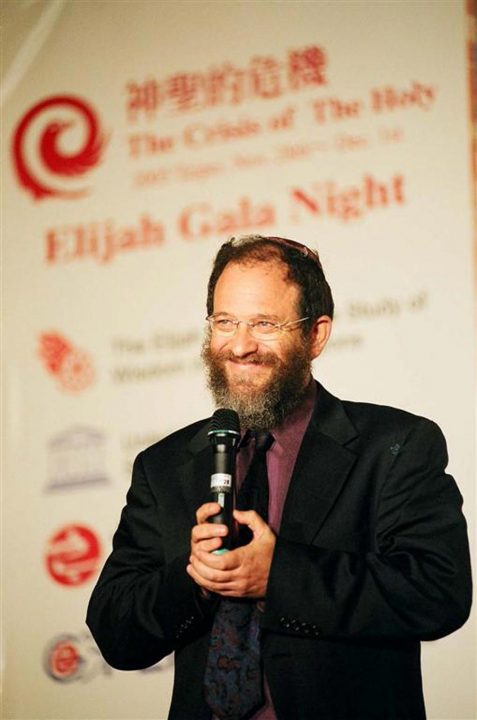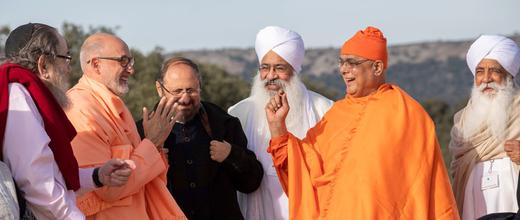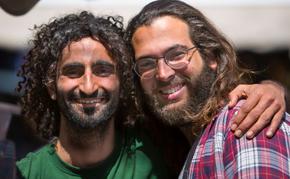The views expressed in our content reflect individual perspectives and do not represent the official views of the Baha'i Faith.
The coronavirus pandemic has significantly impacted all aspects of human life around the planet – including religion. How have the world’s great Faiths responded?
In a new series of interviews with religious and lay leaders from a wide diversity of Faith traditions, Rabbi Alon Goshen-Gottstein, the founder of the Elijah Interfaith Institute, has asked that important question and many more to a prestigious group of 40 diverse religious leaders and scholars.
In three of the featured interviews recently posted on the Elijah Interfaith Institute’s Coronaspection website, Rabbi Goshen-Gottstein speaks in depth with Israeli Jewish Rabbi Ephraim Kenig, Rosh Yeshiva and CEO of all Nachal Novea educational institutions and learning programs; Islamic author and George Washington University Emeritus Professor Seyyed Hossein Nasr; and UCLA Professor of Baha’i Studies Nader Saiedi – and focuses his interview questions on a:
“… new consciousness that can emerge from the moment of crisis. It is one of humility, appreciation for others and one that affirms our own interconnectedness. This has strong consequences for the interreligious situation. Rabbi Kenig speaks of God waiting for a very long time for a time that people can share spiritually, in peace, across their religious differences, in a way that will produce spiritual growth for all. Prof. Nasr shares his perennial philosophy, that recognizes the fundamental similarity in religions and views them as parallel paths up a mountaintop. Prof. Saeidi shares with us Baha’u’llah’s understanding of glory. Glory is not in loving your own group; glory is in loving humankind. Honor used to be connected with hatred of others but, claims Baha’u’llah, we need to redefine honor. Action based on this attitude is true freedom and places service at its center, leading us to true distinction.” – Coronaspection
The coronavirus pandemic, then, has created a global need for introspection on a personal level, and for unity, cooperation and compassion at the level of global culture. As the Baha’i teachings say:
The divine religions must be the cause of oneness among men, and the means of unity and love; they must promulgate universal peace, free man from every prejudice, bestow joy and gladness, exercise kindness to all men and do away with every difference and distinction. Just as Baha’u’llah addressing the world of humanity saith: ’O people! Ye are the fruits of one tree and the leaves of one branch.’ – Abdu’l-Baha

In his summary of the Coronaspection project, Rabbi Goshen-Gottstein highlights the relatedness of all religions and the deep commonality of their core principles:
“The three voices featured in this Introspection feel to me, and I am sure would also feel the same to the speakers themselves, as growing out of the same spiritual matrix. I would characterize this matrix as mystical, contemplative, God-centered, with a strong sense of how everything in life and history contributes to spiritual evolution and to a God-centered reality. It is a matrix from which a view of the human person grows, one that ultimately privileges soul and conscious spiritual processes over intellect. It marshals humility in the presence of God over human technological and scientific achievements, even if these are carried out under a mandate from God. It is one in which spiritual experience is central, hence the need for meditation, contemplation and the integration of mysticism and a spiritual-philosophical understanding into an understanding of religion and its purposes. In a sense, then, this Introspection creates a conversation between three mystics, each growing from similar spiritual ground on different religious terrains.“ – Jewish, Muslim and Baha’i.
Many of the interviewees in the Coronaspection series point out that the loss brought about through the virus gives us all an opportunity to remember what matters most and to return to spiritual basics. The forced interiority of the quarantine provides an occasion for spiritual reflection and, once again, for taking stock of how we are positioned in relation to God and to true reality.
In his interview, Professor Saiedi offers comments on the principle of unity in the Baha’i teachings, and how the impact of the pandemic effects the expression of that unity, saying:
“… we avoid others because we love others, and we don’t want to infect the others – we want to affirm life for everybody. [Baha’is] have a universalistic orientation. When we avoid others, keeping a certain distance from them physically … we have to remember that we do this out of universal love.”
Saiedi also addresses, in the context of the quarantine, the unique Baha’i concept of heaven:
“From a Baha’i point of view, “the other” is heaven – the other is a reflection of God. This unity – the consciousness of solidarity with all beings and so on – that is a realization of heaven, not isolation, not selfishness, not despair, not narcissism. We all must consciously remember the fact that we avoid others, without discrimination, because we love them, because we are affirming the nobility of life for everybody.“
In some ways, the pandemic forces us to think, reassess and reconsider our priorities and re-evaluate where we place our hope and trust. It also forces us to consider what is essential and how loss leads us back to the basics of the life and of the spirit. Our human reality is one of forgetfulness and, as Saiedi states, we can forget our true identity. The message is that we must turn suffering into an opportunity to recall what we have forgotten.

















Comments
Sign in or create an account
Continue with Facebookor